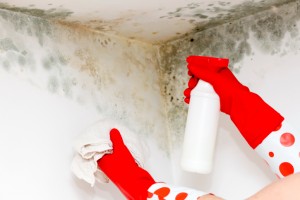
Put down the spray bottle and pick up the phone to call Environmental Consulting and Contracting Group for an effective remediation!
A quick internet search for the term “mold” will yield over 134 million pages. But is that necessarily the best way to get information about this fungal foe? While these sites may have good information, they can also contain false facts. Believing everything on the internet can become dangerous if you are not viewing the correct sources. Take a tip from the experts at Environmental Consulting and Contracting Group and take a look at what you need to know about mold!
Mold Growth
Mold needs four different things to grow: organic material, spores, the right temperatures, and moisture. Mold feeds on carbon atoms that can be found in building materials and other items found in your home like paper and wooden furniture. These items are prime spots for mold spores to float and land on in order to start colonizing. While mold is in the air we breathe, it usually does not harm us because out bodies can fight off the effects when in small doses. But when mold grows in your home and releases millions of spores into the air, we can become ill.
Potential Health Problems
Mold exposure has been associated with many different health effects and symptoms. These symptoms can include allergic reactions, asthma, respiratory complaints, rashes, and has even been linked to cancer, chronic inflammatory response syndrome, and even multiple sclerosis.
Chemicals on Mold
The internet will tell you the best way to clean up mold yourself is to spray the area with bleach or another chemical. But this can actually make the mold situation worse. While killing mold is the ultimate goal of any remediation, it should not be done with sprays. Dead mold spores are just as harmful as live spores and could cause allergies or other health problems.
Reduce the Humidity
Reducing the humidity in your home by 30-60 percent can decrease mold growth in your home. Install bathroom vents, dryers, and dehumidifiers are great ways to reduce the humidity. Increase the ventilation in your home and use exhaust fans when using your kitchen appliances can also decrease the humidity in your home. Condensation can also be a culprit of mold in your home. Insulate your windows, pipes, exterior walls, and floors to avoid condensation.
Mold can cause many different problems in your home. But before taking matters in your own hand, you should do thorough research and call a mold specialist like Environmental Consulting and Contracting Group for a mold test. This test will help to determine the extent of your mold problems as well as how we should handle the problem. For more information on mold testing and mold remediation, call Environmental Consulting and Contracting Group today!
Contact Environmental Consulting and Contracting Group
If you or a family member suspects the presence of black mold or any other type of mold in your home, contact the professionals at Environmental Consulting and Contracting Group. With more than 30 years in the mold remediation industry, we have the experience and tools to help you. Contact us at 410-258-3579 or 1-877-591-MOLD (6653).
Be sure to follow us on Facebook, Twitter, and Pinterest!
Tags: Household Mold, Information, mold knowledge

